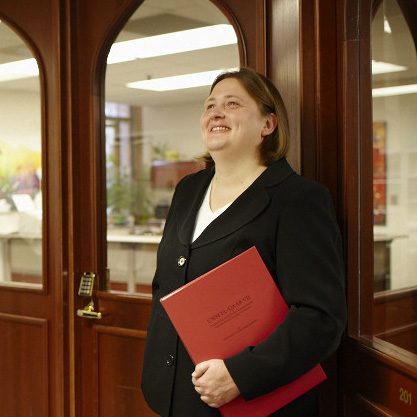Christina Geisen

Christina Geisen
Alumna, PhD, and Former Postdoctoral Fellow, Near & Middle Eastern Civilizations
“Very few scholars worldwide have occupied themselves with ancient Egyptian personal names.”
I am from Germany, where I completed my undergraduate and master’s studies in Egyptology (major), Islamic Studies (first minor), and Pre- and Early History (second minor) at the Rheinische Friedrich-Wilhelms-Universität in Bonn. Following my master’s degree, I decided to pursue studies abroad. I wanted to study in a different language and to get accustomed to a different educational system.
I chose the PhD program in the Department of Near and Middle Eastern Civilizations (NMC) because of the specialization of my PhD supervisor, Professor Ronald J. Leprohon. We share the same research interests—an important basis for a successful doctoral program. Another reason was the great funding system for PhD students at U of T that allows students to focus on their research without worrying about living expenses and tuition fees. Finally, U of T has a great reputation worldwide.
I chose U of T for my postdoctoral fellowship because of my research topic: “Basilophoric Personal Names in Ancient Egypt and Mesopotamia—a Socio-cultural Analysis and Comparison.” Very few scholars worldwide have occupied themselves with ancient Egyptian personal names. My supervisor, Professor Leprohon, is one of them, working on a very similar topic for years. Also, Professor Katja Goebs’ research is closely related to mine. Both professors are invaluable discussion partners. Additionally, the NMC department offers a program in Mesopotamian Studies/Assyriology so that I have important discussion partners for the Mesopotamian part of my project.
Working with my supervisor throughout my PhD program and now as a postdoctoral fellow has been very rewarding. He is always available to give advice on academic matters such as teaching, writing reference letters, presenting at conferences, etc., thus improving the skills necessary for a future university career.
With Robarts Library—one of the premier research libraries in North America—and the library at the Royal Ontario Museum, the University of Toronto offers great facilities in my research area. Additionally, the Royal Ontario Museum has a great ancient Egyptian collection and hosts many scholarly lectures in my field of study.
The Society for the Study of Egyptian Antiquities, based in the NMC department, holds an annual scholars colloquium and symposium and offers scholarly lectures throughout the year, so that I can keep up-to-date with the latest research of other scholars in my field as well as present my own research to the scholarly community.
My experience as a PhD student and SSHRC (Social Sciences and Humanities Research Council) postdoctoral fellow at the University of Toronto has prepared me for a future in the academic world. I had the opportunity to work with and learn from experts in my field of study, to gain valuable experience in being an instructor, and teach in my research area.
In addition, through my work for the Society for the Study of Egyptian Antiquities as president of the Toronto chapter, I gained valuable experience in organizing lecture series and conferences, being part of selection committees for awards and presentations at conferences. Furthermore, I have been able to expand my contacts with Egyptologists around the world.
